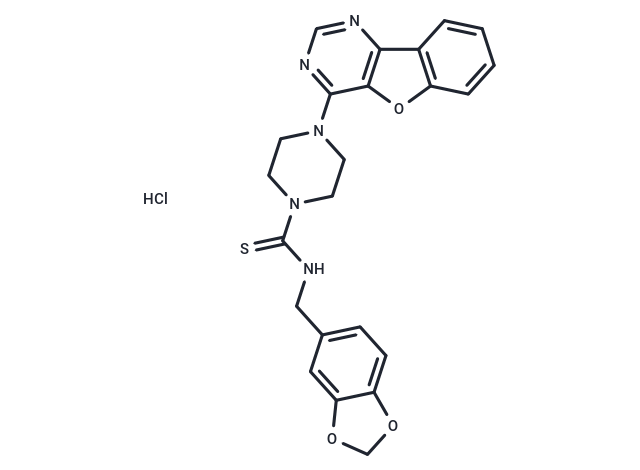Shopping Cart
- Remove All
 Your shopping cart is currently empty
Your shopping cart is currently empty

Amuvatinib hydrochloride (MP470 hydrochloride) is an orally administered multi-targeted tyrosine kinase inhibitor effective against mutant forms of c-Kit, PDGFRα, Flt3, c-Met, and c-Ret, and it suppresses DNA repair by inhibiting the RAD51 protein, contributing to its antineoplastic activity[1][2][3][4].

| Pack Size | Price | Availability | Quantity |
|---|---|---|---|
| 25 mg | Inquiry | 3-6 months | |
| 50 mg | Inquiry | 3-6 months | |
| 100 mg | Inquiry | 3-6 months |
| Description | Amuvatinib hydrochloride (MP470 hydrochloride) is an orally administered multi-targeted tyrosine kinase inhibitor effective against mutant forms of c-Kit, PDGFRα, Flt3, c-Met, and c-Ret, and it suppresses DNA repair by inhibiting the RAD51 protein, contributing to its antineoplastic activity[1][2][3][4]. |
| Targets&IC50 | PDGFRα (D842V):81 nM, c-Kit (D816H):10 nM, c-Kit (D816V):950 nM, PDGFRα (V561D):40 nM, c-Kit (V560G):34 nM, c-Kit (V654A):127 nM |
| In vitro | Amuvatinib (MP470), a novel receptor tyrosine kinase (RTK) inhibitor has shown growth inhibitory activity against a variety of cancer cell lines. Amuvatinib (MP470) inhibits c-Kit (D816V), c-Kit (D816H), c-Kit (V560G), c-Kit (V654A), PDGFRα (D842V), and PDGFRα (V561D) with IC50s of 950 nM, 10 nM, 34 nM, 127 nM, 81 nM, and 40 nM, respectively[4]. Amuvatinib (0.1-10 μM, 4 days incubation) is effective on LNCaP and PC-3 cells with IC50s of ~4 μM and 8 μM, respectively. When Erlotinib (10 μM) is combined with varying doses of Amuvatinib, the IC50 of Amuvatinib decreases to 2 μM on LNCaP cells[5]. Akt activity (as measured by phosphorylation on Ser473) is significantly reduced by 10 μM Amuvatinib (treated for 30 hours) alone. However it is not reduced by Erlotinib or Imatinib Mesylate (IM). Amuvatinib plus Erlotinib completely abolished Akt phosphorylation in LNCaP cells with an unchanged total protein level of Akt[5]. |
| In vivo | Four LNCaP xenograft groups, each consisting of 12 mice, are administered intraperitoneally with either DMSO (control), 80 mg/kg Erlotinib, 50 mg/kg Amuvatinib (MP470), or a combination of 80 mg/kg Erlotinib and 50 mg/kg Amuvatinib daily for 2 weeks, followed by an 11-day observation period. TGI in the group receiving 10 mg/kg Amuvatinib plus 80 mg/kg Erlotinib is not significantly different from the control, but mice receiving 20 mg/kg Amuvatinib plus 80 mg/kg Erlotinib show significant TGI compared to the control (p=0.01) [5]. Individual therapy with either Amuvatinib or Erlotinib induces modest TGI, whereas their combination results in a marked TGI (45-65%). Due to high doses, only five mice or one mouse in the combination arm survive until the end of treatment or the study, respectively. Consequently, the Amuvatinib dose is reduced to 10 mg/kg or 20 mg/kg for the combination treatment. |
| Alias | MP470 hydrochloride, HPK 56 hydrochloride |
| Molecular Weight | 483.97 |
| Formula | C23H22ClN5O3S |
| Cas No. | 1055986-67-8 |
| Relative Density. | no data available |
| Storage | Powder: -20°C for 3 years | In solvent: -80°C for 1 year | Shipping with blue ice. |

Copyright © 2015-2025 TargetMol Chemicals Inc. All Rights Reserved.